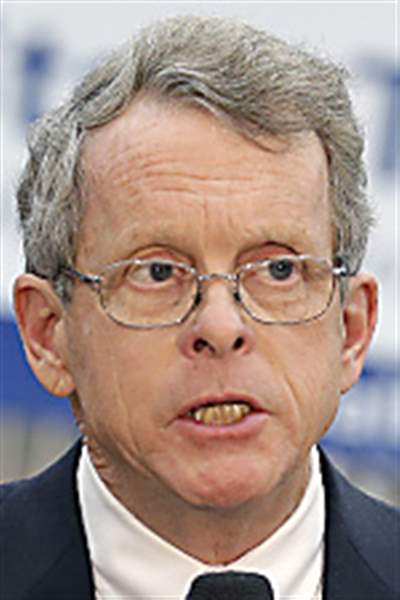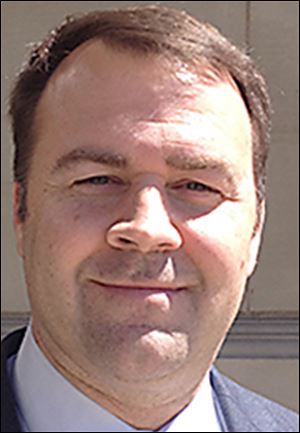
EDITORIAL
Pay to play
8/4/2014
DeWine
ASSOCIATED PRESS

DeWine
Investigative reports by several Ohio media outlets have raised troubling questions about whether some vendors have used campaign dollars to get contracts, worth potentially millions of dollars, from state Attorney General Mike DeWine’s office. Allegations of bid rigging also have emerged.

Pepper
Not surprisingly, Mr. DeWine’s challenger in the November election, Democrat David Pepper, has denounced what he calls rampant pay-to-play politics in the attorney general’s office and demanded sweeping reforms in how bids are awarded. Performance and merit, Mr. Pepper alleged, are far less important than political connections and donations.
Mr. DeWine’s office has denied any improprieties, including any connection between campaign donations and contract awards. No one has accused Mr. DeWine of doing anything illegal, and some of Mr. Pepper’s allegations are misleading.
At issue are not “bids,” for example, where vendors try to submit the lowest price for state work. Rather, they are “requests for qualifications,” in which businesses try to show they can effectively do the work at fees set by the state.
Still, records that appear to correlate some campaign contributions with contract awards damage Mr. DeWine, his office, and the state. Coming in the middle of a campaign, they demand the attorney general’s prompt attention, as well as a commitment to reasonable changes in how efforts to get state contracts are evaluated and monitored.
Appearances matter. Some contracting practices in the attorney general’s office don’t pass the smell test.
So far, Mr. DeWine’s office has done little more than note, through his spokesman, that the bidding process will be subject to a routine annual review in the coming months. That’s not good enough for the state’s top cop, who is charged with rigorously and impartially upholding the law.
A recent Dayton Daily News investigation found that Mr. DeWine’s campaign and the Ohio Republican Party received hundreds of thousands of dollars in campaign donations from lawyers as they sought work from the state.
Since 2010, the newspaper found, the nearly 120 outside attorneys handling debt collections for Mr. DeWine contributed, along with their firms and close family members, $1.38 million to the campaigns of Mr. DeWine; his son Pat DeWine, a First District Court of Appeals judge, and the Ohio GOP. Of the 30 collections attorneys who contributed more than $10,000, the report said, the average annual earnings on debt collection work were $796,500 between 2011 and 2013.
An Associated Press review found that Mr. DeWine’s selection process for hiring outside law firms has gone practically undocumented. AP also reported that a contender for special-counsel work, who was rejected in 2011, submitted practically the same application a year later — after donating $25,000 to the Ohio Republican Party — and was picked.
In an interview with The Blade’s editorial page, a spokesman for Mr. DeWine denied that campaign donations influenced contract awards. Some vendors with contracts did not contribute to Mr. DeWine or the GOP, and collections under the DeWine administration have been the highest in history, he said.
The spokesman acknowledged that the office stopped using a numerical system to score some bids. But he argued that assigning numbers to a vendor’s qualifications is no less subjective than evaluating qualifications in group discussions.
To be sure, the practice of doing favors for political contributors is as old as politics itself. Nevertheless, it is not how either democracy or the state’s chief law enforcement officer should operate — or even appear to operate.
Mr. Pepper has made some sensible proposals that Mr. DeWine should accept. They include having applications for state work independently reviewed “based on clear and transparent performance criteria,” listing all special-counsel firms and third-party vendors on the attorney general’s Web site, and prohibiting fund-raising activity while requests for qualifications are under review.
Given his record of public service, Mr. DeWine deserves the benefit of the doubt. Even so, he would best serve the state, as well as his own campaign, by making needed changes now to reaffirm that his office sets the highest standards for clean and open government.